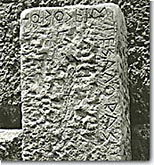


  |
|
It is known that with the "seisachtheia" Solon put an end to the dependence of poor farmers in Attica. What is not known and remains an issue of scholarly controversy, is the course of action that he followed in order to rehabilitate those who had been victimized by the wealthy people's arbitrariness. That is due precisely to the fact that there were no written stipulations (besides, that is what Solon says in one of his poems). With the "seisachtheia" debts were cancelled and any Athenian citizens bound to produce and offer a share of their crop (hektemoroi) were released. Those, on the other hand, who had ended up slaves in Attica, because they were in debt, were set free and those who had been sold as slaves outside the Greek mainland, returned to Athens (Aristotle, Athenaion Politeia 6, Plutarch, Life of Solon 15.3-5). |
|
Moreover, in an attempt to banish the institution of the hektemoros from the citizens' conscience, Solon took away the horoi. These were stone or marble pillars, which marked the limits of the cultivated area and indicated that its cultivator had no right of ownership reminding at the same time the poor farmer's commitments to his proprietor. They usually had a brief inscription, which referred to the horos' function. |
 |
He brought back those who had been sold legally or not outside Attica and those who had left Athens out of need, namely because of their debts. He also brought back the families of those who had been sold or exiled and who had been accompanied by their families since the first moment of their expulsion from Athens. But there were also cases of families who were sent away later, since the rulers had the right to punish that way the descendants of the accused, even if he was no longer in the city. So when an entire family left the city, their land was seized and was no longer available. Even though this stipulation allowed them to return and regain their political rights, it ensured them neither the return of their former land, nor the acquisition of any other tract of land instead. Lastly, Solon set free by the law of Amnesty those who had been enslaved within the city. |
|
| |
|
Note: Click on a picture for a brief description. | |